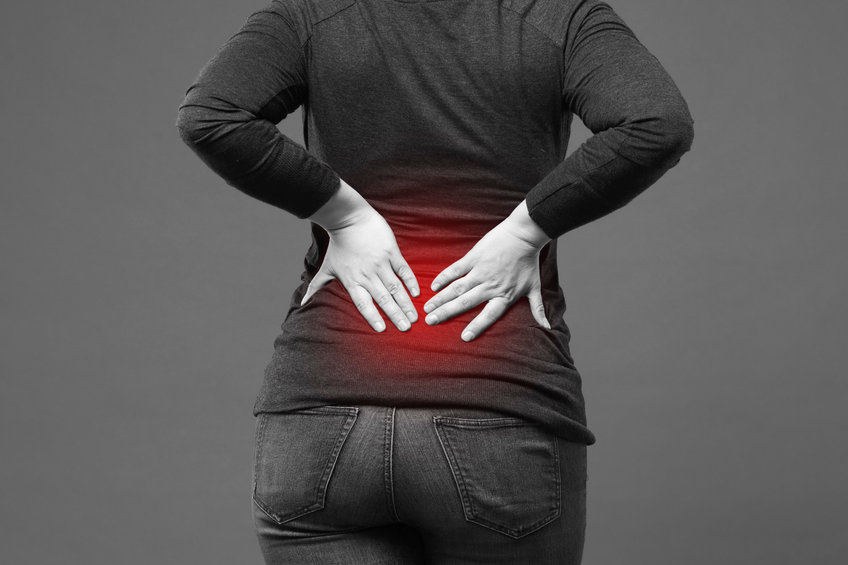How Weight Loss Can Relieve Back Pain
Back pain affects more than half of all Americans at some point in their lives. It is a leading cause of disability. The Institute of Medicine has estimated that chronic back pain costs our country approximately $600 billion a year in medical treatments and lost productivity.
Back pain often lends itself to the creation of a vicious cycle. When people have back pain, they find themselves unwilling or unable to go about their everyday activities or exercise. These periods of “rest” often do more harm than good, and the back pain continues. This is why many experts recommend low-impact activities, like walking, to help heal from back pain.

This begs the question: will losing weight alleviate your back pain?
It’s a straightforward question, but the answer isn’t so simple, despite many strong connections between back pain and being overweight. If you are concerned that your back pain may be connected to your weight, read on.
How Weight Gain May Cause Pain in Your Back
Why does the location of your excess weight matter when it comes to back pain? Because while weight gain doesn’t cause back pain in and of itself, it may cause various traumas or postures that lead to back pain.
Excess weight around the stomach, for example, needs to be carried by the body. If an overweight person is not being cautious of their posture, their body may carry their weight by pulling the pelvis forward. This demands more work from the lower back.
This work may only result in minor strain, but the problem could also become much more serious. In fact, this rearrangement of the low back may cause damage to the actual structure of the spine. This is why people who are overweight may experience a herniated disc, in which the disc bulges out of its spot between the vertebrae of the spine.
If the disc comes out of its place, it could place pressure on the surrounding nerves. If the lumbar nerve is pinched, a patient may experience sciatica pain.
As these changes occur, the body may try to reduce pain through inflammation. Unfortunately, excess inflammation can lead to other types of back pain, including ankylosing spondylitis and other forms of spinal arthritis. Persisting inflammation can cause lasting damage, including joint fusion and other damage.
The longer a patient lives with excess weight and strains their back, the higher their risk for more permanent damage. Even if you are experiencing mild pain and are slightly overweight, it might be time to reassess your health and make some changes to alleviate the back pain.
Maintaining a healthy weight or losing weight can help ease or prevent back issues, and reduces stress on other joints as well. Dropping just a few pounds can make a big difference to your back. For every four pounds you lose, you remove 16 pounds of pressure from your spine. In one study, the risk of developing osteoarthritis dropped 50 percent with each 11-pound weight loss.
What Can You Do?
First, make an appointment with our orthopedic spine doctor. Your medical professional can provide a diagnosis of your back pain, as well as assist you not only by prescribing a safe weight loss program but also in assessing other factors that may contribute to your pain. These range from genetic causes to posture, and excess sitting/lack of general movement.
Losing weight is key. While it may be a challenge to lose weight, doing so will effectively reduce strain on your spinal column and on your back muscles. These structures will work less hard to help you perform everyday tasks. To this end, the North American Spine Society recommends staying within 10 pounds of your ideal weight in order to keep your back healthy.
Exercise is recommended for people with nearly all types of back pain, but some conditions warrant certain modifications for safety’s sake. Your medical professional can guide you in an exercise program. In addition to cardiovascular health, strength and flexibility exercises work toward developing balanced strength in the muscles that control the pelvis and trunk. This, in turn, can protect your back by facilitating an even wear and tear on your joints and by taking a load off your spine.
In addition, movement through gentle exercise stimulates healing and a flow of nutrients within the spine. This is especially important for the spinal discs. Physical activity causes the discs to swell with water and then squeeze it out, which exchanges nutrients between the discs and other spinal structures. In those who fail to undergo sufficient physical activity, the spinal discs are deprived of these vital nutrients they need to stay healthy and functional.
Garrow Wellness Center Offers Comprehensive Spine Expertise
Garrow Wellness Center offers comprehensive top-quality expertise and patient-centered care. Our back specialists diagnose spine problems and design custom treatment plans built on a conservative, non-surgical approach. Most patients find relief through treatments including guided movement, specialized physical therapy, biofeedback, exercise, and activity modification. Together with you, we will determine the right course of action.
Start your journey toward a healthy spine. Request an appointment online, or call us at 732-965-3133 to schedule a spine consultation.

